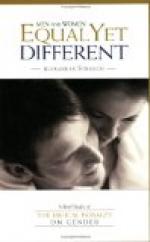That marriage was designed by the Creator for the mutual benefit, help, and happiness of those entering into that relation, there can be no doubt; but, through the selfishness of man—helped on by the fact that, like the partner referred to previously, he was physically the stronger of the two—the gracious purposes of the Creator were lost sight of, or ignored. And God suffered it so to be, for the time, just as he did other forms of slavery and outcrying sins of various kinds.
It has been said that the marriage ceremonies and festivals were as various as the several nations in which they were performed. A description of a few of these may not be uninteresting.
Among the Jews, the period of betrothal having expired, the marriage was celebrated by a feast, the bride being arrayed as magnificently as her circumstances would allow. If the contracting parties were distinguished personages, the ceremony was frequently celebrated at night, the bridal party, carrying their lamps or torches with them, going forth in procession to meet and do honor to the bridegroom.
With the Romans, the consent of the father or guardian of the maiden having been obtained, a sacrifice was prepared. “The gall was carefully removed,” and the propitiatory offering made to the gods. To have been emblematical, the gall should have been presented to the bride. In most cases, it fell to her lot. On the wedding-day the bridegroom, with his attendants, presented himself at the place designated for the performance of the ceremony, where he was met by the bride, gorgeously appareled, and her maids. Then, in presence of her father or guardian and proper witnesses, the pair went through a formula of words as given them by the officiating priest. On the completion of this part of the ceremony, the company partook of a cake made of flour, salt, and water. This was the original “bride-cake.” After night, the bride, accompanied by her relatives and maids of honor, was escorted with due pomp to the residence of the bridegroom, the door of which she found bound with strings, over which she was obliged to step. Having effected an entrance, she received the keys of the house, and the bridegroom and herself again repeated, after the priest, the formula which had been gone over earlier in the day. Then, having touched fire and water, and sacrificed to the domestic gods, which were placed on the table, the wedding festivities commenced, and were continued till midnight, when the guests dispersed.
In India, the magnificence of the marriage-feast can scarcely be imagined, especially when celebrated by torch-light procession.
In almost all the nations of antiquity, who had any marriage ceremony at all, a woman’s wedding-day was one of splendor and apparent honor, the only day in which any of her wishes were deferred to during her whole lifetime. Light was soon lost in darkness—anticipated pleasure in disappointment, degradation, and despair. The day of her death was the first day of her freedom.




